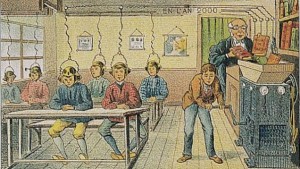Good sci-fi is often a metaphor for something in our lives. Star Trek was dealing with a future where we came out of the other side of the civil rights movement and the cold war intact and better for it. George Orwell made a police state so convincing that the modern day governments apparently took it as a how-to manual. Philip K Dick often wrote about worlds where people were often convicted before they had done any wrong and where your identity was up for question – after one hell of a drug problem left a mark on him (seriously, A Scanner Darkly was based on his drug trips).
But writing good sci-fi isn’t just about having a metaphor in mind. There’s often a lot of great work that is based simply on an idea with great characters. Conversely, there’s a lot of stuff with a philosophy behind it that falls short of the mark because the actual sci-fi portion of it is so poorly handled. It’s the ones that find a balance between the fantastic and the relatable that endure for years to come.
This is particularly noticeable in writing the future or near future. When writing about something that’s rooted more in theoretical science it’s easy for that work to shift to just simple fantasy over time. The first true “Science Fiction” Novel ever was Frankenstein, but the casual observer today would sit it in the same category as Dracula and other fantasy stories. But when something is working on an idea of the future and sticking to the mundane, it becomes a lot harder to find a place for it. We couldn’t very well call some ideas we had in the past “fantasy”, but it’s hard to ignore how outrageous it now seems in hindsight.
So how do you walk that line? How do you make your portrait of the future something that can withstand that test of time? Continue reading Writing the Future



